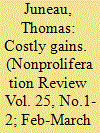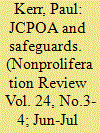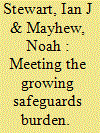| Srl | Item |
| 1 |
ID:
150092


|
|
|
|
|
| Summary/Abstract |
This article investigates the nuclear postures available to Israel in the wake of the Joint Comprehensive Plan of Action (JCPOA) between Iran and the P5 + 1. An “existential bias” pervades much of the literature on nuclear postures. Most scholars assume that once a state acquires the bomb it can deter all forms of aggression. However, recent scholarship has shown this to be untrue given that regional nuclear powers operate under much greater constraints than the U.S. and Russia or the Soviet Union. Israel faces tradeoffs between three postures: a catalytic posture, which would involve greater reliance upon the U.S.; assured retaliation, its current posture; and first use. Should Jerusalem continue to fear the prospect of abandonment by the U.S., it may turn to a first-use posture in order to leverage its conventional and nuclear superiority over its neighbors.
|
|
|
|
|
|
|
|
|
|
|
|
|
|
|
|
| 2 |
ID:
160986


|
|
|
|
|
| Summary/Abstract |
Iran’s nuclear ambitions have been at the center of Middle Eastern politics and a global nonproliferation source of concern for almost twenty years. Much has been written on the topic, but one important question has received less attention: was it beneficial for the Islamic Republic? How have the gains and losses associated with its nuclear pursuits compared with each other? This article attempts to provide a comprehensive assessment of the costs and benefits of Iran’s nuclear program. We start with an overview of the literature on why states pursue nuclear programs. This allows us to build a list of objectives that states can hope to achieve through their nuclear ambitions. We use these as yardsticks to assess the gains Iran has reaped and the losses it has incurred. This leads to the conclusion that, although Iran has earned some benefits from its nuclear program, these have been costly; ultimately, the costs have exceeded the benefits. We conclude by reflecting on what the Iranian case tells us more broadly about the study of nuclear proliferation.
|
|
|
|
|
|
|
|
|
|
|
|
|
|
|
|
| 3 |
ID:
182903


|
|
|
|
|
| Summary/Abstract |
SIGNALS from Washington on the readiness of the Joe Biden administration to consider the possibility of concluding a new international nuclear deal with Tehran raised certain hopes for unblocking the situation around Iran. Positive forecasts were also expressed in Iran...
|
|
|
|
|
|
|
|
|
|
|
|
|
|
|
|
| 4 |
ID:
157822


|
|
|
|
|
| Summary/Abstract |
Although the nuclear safeguards established in the 2015 Joint Comprehensive Plan of Action (JCPOA) are explicitly confined to application in Iran, some experts and policy makers have considered whether these supplementary measures could be applied to other states of proliferation concern. While the JCPOA has provided some useful additions to the International Atomic Energy Agency (IAEA) safeguards toolkit, its legacy for the broader IAEA safeguards mission is unclear. To better assess this potential legacy, this article considers the JCPOA in the context of the evolution of safeguards, particularly the developments following the 1991 Gulf War and subsequent changes to safeguards implementation in Iraq. The article then describes the JCPOA’s safeguards in Iran and the potential to apply similar provisions elsewhere.
|
|
|
|
|
|
|
|
|
|
|
|
|
|
|
|
| 5 |
ID:
171177


|
|
|
|
|
| Summary/Abstract |
The International Atomic Energy Agency (IAEA) faces challenges in fulfilling its safeguards mandate as a result of an expanding safeguards burden and a relatively static budget. This dilemma has been exacerbated by the additional burdens of implementing the Joint Comprehensive Plan of Action (JCPOA) in Iran, but would not go away if implementation of the JCPOA were to end. There are three main areas of opportunity for the Agency: (1) budgetary expansion tied to changes in staffing policies, (2) changes in safeguards approaches, and (3) technological innovation. Barriers and limitations are associated with each approach, and advancing any of them will face a difficult political environment in Vienna.
|
|
|
|
|
|
|
|
|
|
|
|
|
|
|
|